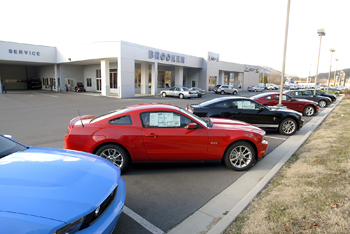After losing money for two years, Allen Brooker made money in 2010, driving his beleaguered Ford dealership out of the pits and onto the straightaway.
Brooker Ford in Dalton, Ga., which marked its 50-year anniversary this month, could continue to benefit in 2011 from a resurgent domestic car market and a wave of consumer loyalty, Brooker said, overcoming the weak local economy and slow national recovery.
Only about 10 percent of auto dealerships make it to 50 years, a number that has shrunk with recent automaker-mandated closures and consolidations that favored "what you did today over what you did yesterday," Brooker said.
The Ford dealership's history dates back to 1960, when it tied its fortunes to those of the Ford Motor Co.
Henry Ford founded in 1903 what some now consider the quintessential car company, but he couldn't have known that his brainchild would be the sole major domestic car manufacturer to avoid bankruptcy amid the Great Recession.
Of the Big Three, Ford was the only automaker to refuse a government bailout in 2008, and Brooker Ford's service manager said that's one of the reasons customers tell him they keep coming back.
"I keep hearing people say that they're behind Ford," said Steve Hanshaw, who has been with Brooker Ford for 33 years. "It's good to have that goodwill. It's got to help."
It's nice to have help in the Dalton market, where incomes and the local work force seem to be shrinking, said Brooker, who owns both Brooker Ford and North Georgia Toyota.
The collapse of the nation's housing market hit Dalton especially hard. Many of the products manufactured there, including most of the world's carpet, go into new homes, and high foreclosure rates have drastically reduced new home construction.
"In Dalton the problem is not as much unemployment as it is underemployment," Brooker said. "People who are used to working 60 hours are now working 35 to 40."
With the closure of Brooker's Family Hyundai store on Walnut Avenue earlier this year, the company had to cut employees, hours and auto stock at the remaining two locations to bring the company back to profitability.
"The glory days back in the late 90s when the industry was selling 16 to 17 million vehicles per year in the U.S., you didn't have to be a very savvy dealer to make money," Brooker said. Ford expects industry sales to grow from 11 million to 13 million units in 2011.
To start writing with black ink again, Brooker turned to new media and the Internet to better market his vehicles, and hit the gas on the service side of his business. The strategy worked, and after losing money in 2008 and 2009, "we are going to show a profit for 2010," he said.
50 Years
Allen Burnette and Ed Brooker, Allen Brooker's father, founded in 1960 what is now Brooker Ford, though Ed Brooker didn't fully buy out the company from the ailing Burnette until 1977.
The two sold a variety of brands over the years, from International Harvester and Chrysler to Plymouth and DeSoto, but it was the Ford store that proved its staying power as other franchises rose and fell with the financial seasons.
Through the years, Allen Brooker grew up and began observing his father's management style and the Brooker business philosophy.
"When he liquidated the Chrysler-Plymouth store, he took that money and opened North Georgia Toyota in 1975," Allen Brooker said. "His friends told him he was crazy, because, 'as a World War II vet, what in the world are you selling those Japanese cars for,' but it was the best decision he ever made."
The profit from the Toyota dealership helped fuel up what was at the time an ailing Ford dealership, Allen Brooker said, and led to a 2007 expansion to the current Shugart Road location.
Then the wheels came off. Banks failed, markets dropped and consumers stopped buying cars.
Ford's financial arm drastically cut the amount of inventory dealers could carry, a situation Brooker saw as "kind of a Catch-22,"
"You can't sell out of an empty lot, but they want us to sell more vehicles before they'll extend our credit," he said.
Leaner, Meaner
To break even on costs during the good times, Brooker had to sell around 65 cars per month. Through significant cost reductions, that number is now down to 40, he said, representing a 20 percent work force reduction and renegotiated supplier contracts, among other measures.
The dealership has emphasized the service side of its business with the addition of a Quick Lane service center, in recognition that "people are holding onto their vehicles longer," said Hanshaw, manager of the service department.
Consumers worried about job security are less likely to spend tens of thousands of dollars on a new car when they can spend a couple thousand to keep it running, dealership officials said.
Hanshaw has seen the cost of repairs going up as the average age of serviced vehicles rises, even as total visits decreased.
He said that last month, Brooker had 860 visits, while in November 2009 it had 1,150 visits. But, Hanshaw said the business did $3,000 or $4,000 more in business in 2010 because customers were spending an average of $100 more per car.
If all continues to go well, the dealership could hire back one or two service technicians, and even increase inventory by 10 to 15 cars.
The dealership has clawed its way back, Hanshaw said, and is on track to participate in what Ford projects will be a growing market next year.
"I think in living memory for most of us, this recession was unprecedented," Hanshaw said. "But we're trying to get this to a place where can run this another year, and another year, and another year."

